Jul 24, 2020
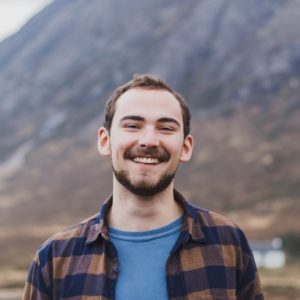
2020-2021 Precious Blood Volunteer, Thomas Weiss
Thomas Weiss will be serving as a Precious Blood Volunteer at Precious Blood Ministry of Reconciliation in Chicago, Illinois. He grew up in St. Louis, Missouri, and graduated from the University of Notre Dame with a degree in the Program of Liberal Studies, Notre Dame’s Great Books education.
Why do you want to volunteer?
“The most formative experience of my education was the summer service program I completed after my sophomore year at Notre Dame. Living in intentional community at Hope House and serving at PBMR will hopefully be an equally illuminating and restorative experience for me.”
Why do you want to volunteer with Precious Blood Volunteers?
“The values of Precious Blood Volunteers outline the kind of life I hope to live. Commitment to serving those from suffering communities and a drive to redevelop often backward social systems resonate with the direction of my heart as I transition out of college and toward a career informed by Christ’s message of peace and compassion.”
What are you looking forward to about your volunteer experience?
“I am excited to step out of the classroom and into the real world. Having spent four years mostly reading books and writing essays, I am thrilled to have the opportunity to put my ideals into practice and to learn to sharpen my understanding of social realities through first-hand experience with those living on the south side of Chicago.”
Learn more about Precious Blood Volunteers at preciousbloodvolunteers.org.
May 1, 2019
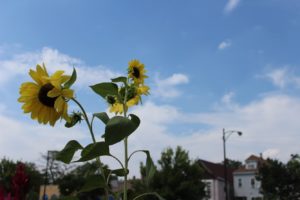
by Steven Dougherty, Precious Blood Volunteer
Steven Dougherty is a Precious Blood Volunteer serving at Precious Blood Ministry of Reconciliation (PBMR) in Chicago, Illinois. In the three reflections below, Steven paints pictures of hope he has encountered while working there.
My second week in Chicago was one of the most violent in recent history. Waiting for the bus, I saw a man and a woman talking. They spoke slowly. The air was thick and hot. As she was leaving, the woman leaned in and hugged the man. Then she held him for a moment at arm’s length. She looked him in the eyes, and with worry in her throat she said, “Be safe.” Her words, thick in the hot air. They were desperate wounded words, heavy with fear. This was a command, a salutation, a wish—something impossible, or at least it seemed so at the time. So many people had died. Then she let the man go, freeing him from her temporary protection, hoping her wish would be enough. I thought it was beautiful how much she cared for this man, how well they must have known each other. Then the woman came to me and did the same!
****
In my months of volunteering at PBMR I have witnessed struggle, I have witnessed pain, and I have witnessed loss. I have been asked many times about hope. How can I stay hopeful doing the work I do at PBMR? I struggle with this, because finding hope feels like a privilege. If I say that I have hope that this community I work in will be revitalized and not gentrified, if I say that I hope the people we help can get jobs and will be treated fairly, or if I say that I hope people will stop dying so young, I am doing so only for myself. I think these things because at the end of the day I am tired. I have done what I know I can do, and the rest seems impossible, so I hope. I am not saying this is a bad thing, only that is not the thing I want it to be. Access to hope has become a privilege. It has become a way of distancing ourselves from the responsibility of the world’s problems. Hope for things to get better keeps things the way they are.
But there is another side to all of this, because hope does not have to be something that is stagnant. Hope can move through us and into others. When this happens, when hope draws us together, there is power—power for real change in the world. When people work together with a united vision of hope, when they know exactly what they want to accomplish, hope can be actualized. We can reach out with hope and work together to make sure that everything will be okay, and although it is hard, we do this work anyway.
In my months of volunteering at PBMR I have also witnessed this: a new kind of hope—a hope that does things in the world. It is a hope that people share with strangers. It is mixed with fear and pain, but it is strong enough to overcome them both. Since it was given to me by the woman at the bus stop, I have seen it all over Chicago, I have even used it myself: “Be safe.” There is so much behind these words. They carry a message that you are cared for, and they carry a promise that although there is so much danger that I cannot solve, you have my protection. Anytime someone leaves the Center you hear all of this. Everyone is not always safe. In fact, our participants are rarely safe—but will still hope. We believe the impossible and together we make it a little more possible.
****
The man in front of you seems old but you know that time does not pass here as it does elsewhere, so in the letter to your friend you will call him worn. He is asleep. He has been asleep since you got on the bus, and since you got on the bus, the bus has filled with heat and pressure.
In the letter to your friend you will compare it to the sun—the bus—and now it grows loud. A child begins to scream. The heat and the pressure move through your spine and you feel beyond heavy—you feel worn.
You cannot make out the words of the child. In the letter to your friend the back of the bus will be another world, one that is burning in its closeness to the sun. All you hear is longing. Longing that makes you think to write a letter to your friend. Longing to be heard: the painful pulling apart of a body from its limbs. In the letter, you will call it gun violence in Chicago. The man in front of you who you will call worn, but who you know is old for this bus and the violence, whispers with his eyes still closed, “Hey now, it’s gonna be okay.” You are not sure who he means to say it to, the child or himself. In the letter to your friend he will say it to everyone because “it” is a delicate thing: the bus and the child and your spine and Chicago, but you believe him anyway.
Steven is a current Precious Blood Volunteer serving at Precious Blood Ministry of Reconciliation in Chicago.
To learn more about becoming a Precious Blood Volunteer go to www.preciousbloodvolunteers.org
This article originally appeared in the May 2019 edition of the New Wine Press.
Feb 1, 2018
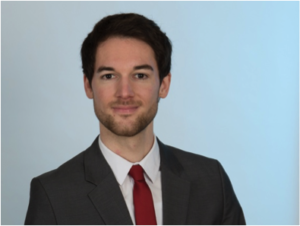
2017-2018 Volunteer Martin Echtler
by Martin Echtler, Precious Blood Volunteer 2017
Before I left my home in Munich to move to Kansas City I had a lot of different feelings and expectations regarding the Precious Blood Volunteer program and the United States in general. There were a lot of questions in my mind like “How it will be to work as a volunteer?” “Which people will I meet?” or “How will I deal with cultural borders or language limitations?” Besides these “big questions” there was another aspect, more ordinary, which was not really on my agenda in the run up to my journey – the question “How will I get around in Kansas City?” I was not worried about it, because I thought it would be like in Munich where a wide variety of different public transportation options makes it not too complicated to get from point A to point B.
My view would change after a few days in the city, when I realized that most of the people drive their own car to get around. After realizing this I thought “Well, I don’t think it’s a big deal, because I’ve heard Kansas City has a new street car and a really good bus system.” After using the street car the first time my view changed a little bit. And after a few (long) times waiting at the bus stop my view changed a little bit more. My first conclusion was “Oh boy, it would be so much easier to have a car to get around.” But during the next months my point of view would change again.
The more time I spent in Kansas City with different people at work, at home or somewhere else dealing with lots of different situations, the more I realized that indeed I don’t have a physical car, but I already sit in and drive another, special kind of “car.” At this point you might think “This weird German guy must be crazy, because he can see invisible cars.” But let me explain this within a poem I wrote. It deals with my time here as a volunteer in the Midwest of the United States and that it feels like a car ride – an inner car ride. I started at one point to “drive” and since then I’m “on the road”.
The Ride
Always forward – straight ahead or taking curves, uphill or downhill, slow or fast.
Look to the rearview mirror from time to time. Look to the exterior mirror from time to time.
Watch the lane, watch the vehicles in front and behind, watch the oncoming traffic, watch the signs, watch planned destinations.
Pay attention to passengers, watch out for other vehicles.
Don’t exceed the speed limit.
Don’t lose sight of the goals – don’t miss exits.
The fastest ways are not necessarily the most beautiful. Beautiful ways lead also to destinations.
Don’t forget to watch the gas gauge. Don’t drive too long distances in a row – take brakes and recharge batteries for the onward journey.
Pass cars sometimes – let cars pass you sometimes.
Rev the engine sometimes, crash sometimes, repair or get repaired sometimes.
Stop sometimes and ask for directions – drive away sometimes and ask for a stop.
Focus your view on the horizon sometimes – focus your view on the steering wheel sometimes.
Escape to the front sometimes – let your gaze stay on the rearview mirror sometimes.
Take curves from time to time – and avoid it from time to time.
Sometimes it’s necessary to select one lane and sometimes it’s necessary to take the other – it is necessary to ignore obvious signs that wants to lead sometimes – it is necessary to consider hidden signs sometimes.
Let the engine howl sometimes – drive quietly sometimes.
Talk to your passengers sometimes – just listen to them sometimes.
Follow their advice sometimes – ignore them and follow your instinct sometimes.
Once in a while take a deep breath of air.
Once in a while dim your lights.
Wait sometimes and sometimes let wait.
Drive in circles sometimes – take exits sometimes.
Pick someone up sometimes – leave someone behind sometimes.
Face the sun, face the clouds, face the wind.
Sometimes being driven – sometimes drifting.
Now and then do not know further – now and then knowing with new knowledge again.
Switch gears now and then – brake now and then.
Laugh sometimes, cry sometimes, sing sometimes, whisper sometimes, keep silent sometimes.
Drive aware – drive by yourself.
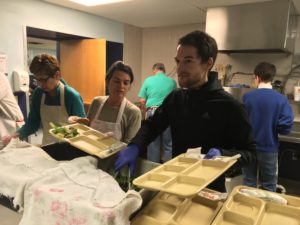 The few metaphors show that there are a lot of things you have to deal with when you’re “on the road” – even if you don’t own a physical car. Besides all the aspects I’ve named I’ve learned one very important lesson during my journey, which I want to emphasize at this point. Of course it’s important to look back and to plan next steps, but keep your main focus on the current street you’re driving through and the environment you’re passing right now. And also pay attention to the people who are driving with you just in this moment. Be aware about the current time, because the past is gone and the future is unwritten. A deep focus on the street you pass right now helps you to enjoy your ride more, it keeps you awake and prevents you from accidents.
The few metaphors show that there are a lot of things you have to deal with when you’re “on the road” – even if you don’t own a physical car. Besides all the aspects I’ve named I’ve learned one very important lesson during my journey, which I want to emphasize at this point. Of course it’s important to look back and to plan next steps, but keep your main focus on the current street you’re driving through and the environment you’re passing right now. And also pay attention to the people who are driving with you just in this moment. Be aware about the current time, because the past is gone and the future is unwritten. A deep focus on the street you pass right now helps you to enjoy your ride more, it keeps you awake and prevents you from accidents.
This consciousness let me “drive” through Kansas City without having a car. All the love, friendship, beauty, hospitality, open doors and smiling faces I’ve already passed on this journey make me grateful and happy!
You can learn more about serving as a Precious Blood Volunteer by going to www.preciousbloodvolunteers.org
You can learn more about our placement at the Bishop Sullivan Center by going to www.preciousbloodkc.org/bishop-sullivan-center/.
Feb 28, 2017
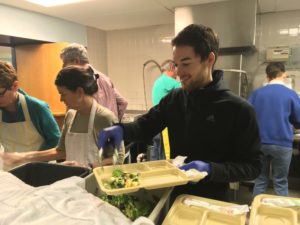
Precious Blood Volunteer, Martin Echtler, serving dinner at the Bishop Sullivan Center
The Bishop Sullivan Center’s mission is to provide basic necessities to people who are unable to do so, and to assist those who are able to become financially self-sufficient by finding employment. The Bishop Sullivan Center’s Troost location is located in the heart of Kansas City at 39th St. and Troost Ave. and provides food for those are hungry, assistance for those who need it, job training/placement for those looking for work, air conditioners for the elderly and emergency assistance. On weekday evenings the Bishop Sullivan Center hosts meals at their Community Kitchen where people can be nourished by food and community.
The Bishop Sullivan Center has two other locations in Kansas City, Missouri and Kansas City, Kansas. They are one of the largest distributors of food and emergency assistance in the Kansas City area.
As a Precious Blood Volunteer serving at the Bishop Sullivan Center you will have the opportunity to walk with and serve others in a variety of ways. They include supervising the community kitchen, working with the Kansas City Medicine Cabinet, helping out with the food pantry and assisting in their job placement/training program. This placement is for you if you are looking for a career in social services, non-profits or ministry.
You can learn more about the Bishop Sullivan Center by going to their website.
Read a reflection by former Precious Blood Volunteer, Nora O’Connell, about her experience at the Bishop Sullivan Center here.
You can apply to serve as a Precious Blood Volunteer at the Bishop Sullivan Center on our Apply Page.
Nov 28, 2016
By Former Precious Blood Volunteer Ryan Cornelissen
One of the most identifiable themes of Advent is preparation. But preparation for what? The birth of Jesus? The Catholic tradition of Christmas includes the season of Advent, because we are to understand how the radical truth of Jesus’ message provokes conversion and change of behavior. In the readings for the First Week of Advent-Year A, both St. Paul’s Letter to the Romans and Matthew’s Gospel point to the urgency and necessity to prepare ourselves to best interact with the body of Christ in the world as Jesus did. Of course, it is important to be mindful of the actions and behaviors we should avoid—as Paul mentions in the second reading—as an effort to condone proper conduct. But, in my opinion, the Gospel reading from Matthew better points us to a lifestyle of being awake! Instead of merely avoiding attitudes and practices, the conscious choice to be awake promotes a proactive searching and preparation for the truth that we are to live out.
[fusion_builder_container hundred_percent=”yes” overflow=”visible”][fusion_builder_row][fusion_builder_column type=”1_1″ background_position=”left top” background_color=”” border_size=”” border_color=”” border_style=”solid” spacing=”yes” background_image=”” background_repeat=”no-repeat” padding=”” margin_top=”0px” margin_bottom=”0px” class=”” id=”” animation_type=”” animation_speed=”0.3″ animation_direction=”left” hide_on_mobile=”no” center_content=”no” min_height=”none”]
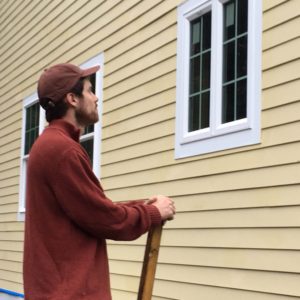
Ryan Cornelissen in front of a Habitat for Humanity home
As a Construction Site Supervisor for Habitat for Humanity in Boston, I lead volunteer groups through the process of building homes for those in need in the greater Boston area. In addition to working with volunteers, I have the pleasure of working alongside the families who are selected for each home to complete their 300 hours of “sweat-equity” on their future home (the equivalent of a down-payment on their house). Working alongside the mothers and fathers, I have the privilege of hearing stories of the reality of life before Habitat for these families.
This month, two new families were selected for the final duplex of a three duplex development in Roslindale, a Boston suburb. Felipe, one of the selected fathers, continues to share with me different pieces of the complex puzzle that is his life. Living in a 700 square foot apartment with his wife and two daughters (ages 3 and 8) was not exactly his dream. Felipe’s family is originally from the Dominican Republic, but he grew up in the United States. He works as a maintenance supervisor for a homeless shelter and rehabilitation support center in the Boston area, and when describing his job speaks of the importance of allowing people to share their stories and be listened to. Sitting there with my jaw wide open, I wished Felipe knew that his story is also worth listening to.
Earlier this week, up on the scaffold with Felipe installing siding on the gable wall of his future home, I decided to ask some simple questions to get to know him a bit better.
I asked him jokingly, “So, do you have any hobbies that you used to enjoy before having kids?” Felipe responded, “Can I be completely honest with you?” “Sure!” I said. “Well, my hobby has been preparing my family for where we are today,” Felipe stated.
Every minute that he has, Felipe is working at his job, and on-site with Habitat, to obtain a better life for his family. Before Habitat, every waking moment Felipe had outside of work he spent trying to learn about the daunting world of home ownership and financial responsibility. Felipe uses his time, effort and gifts for the benefit of his family; most days he doesn’t even eat lunch, so that his children can. Being connected to Habitat for Humanity is like a dream come true for Felipe and his wife. When they complete their hours, they will be the first members of their families to own a home.
The sense of urgency and attentiveness Felipe embodies as he puts the futures of his wife and daughters above his own is the type of preparation God has in mind for Advent. Christ is coming into the world as a human being, prepare! Each day God is coming to you in human form, will you be prepared? Will you give your best self no matter who is sent and what the circumstance? Felipe’s desire to give and serve his family is lived out each day as he works towards the goal of home ownership and a better future for his two daughters. The same goes for us that each day we are called to endlessly pursue a deeper relationship with God to better adjust our vision to Jesus’ vision and humbly expose our wounds and flaws in hopes of being held and healed by our loving God.
Just as Felipe gives of his life daily for his wife and daughters, we come to find that this journey is not about us, but instead the bringing about of God’s glory in the world. As you reflect this Advent, know that now is the time to prepare yourself and respond to God’s call for you to humbly carry the message out into the world.
To learn more about Precious Blood Volunteers go to www.preciousbloodvolunteers.org or contact us at volunteers@preciousbloodkc.org.
To apply to become a Precious Blood Volunteer go to https://preciousbloodkc.org/pbv-apply/
You can also read another one of Ryan’s reflections at https://preciousbloodkc.org/thanks-and-giving/




 The few metaphors show that there are a lot of things you have to deal with when you’re “on the road” – even if you don’t own a physical car. Besides all the aspects I’ve named I’ve learned one very important lesson during my journey, which I want to emphasize at this point. Of course it’s important to look back and to plan next steps, but keep your main focus on the current street you’re driving through and the environment you’re passing right now. And also pay attention to the people who are driving with you just in this moment. Be aware about the current time, because the past is gone and the future is unwritten. A deep focus on the street you pass right now helps you to enjoy your ride more, it keeps you awake and prevents you from accidents.
The few metaphors show that there are a lot of things you have to deal with when you’re “on the road” – even if you don’t own a physical car. Besides all the aspects I’ve named I’ve learned one very important lesson during my journey, which I want to emphasize at this point. Of course it’s important to look back and to plan next steps, but keep your main focus on the current street you’re driving through and the environment you’re passing right now. And also pay attention to the people who are driving with you just in this moment. Be aware about the current time, because the past is gone and the future is unwritten. A deep focus on the street you pass right now helps you to enjoy your ride more, it keeps you awake and prevents you from accidents. 
